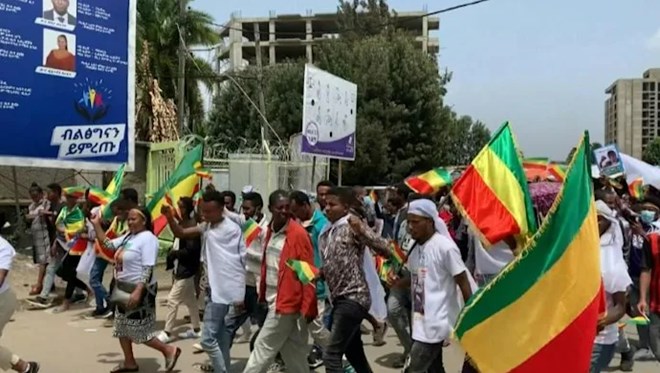
Monday June 21, 2021

Ethiopians began voting Monday in a closely-watched election taking place as famine grips the war-torn Tigray region and doubts linger about the credibility of the twice-delayed vote.
It is the first electoral test for Prime Minister Abiy Ahmed, 44, who rose to power in 2018 championing a democratic revival in Africa's second most populous country, and a break from its authoritarian past.
The Nobel Peace laureate, who freed political prisoners and welcomed back exiles, promised this election would be Ethiopia's most competitive in history, free of the repression that marred previous ballots.
At a polling stating in the centre of the capital Addis Ababa, voters began casting their ballots at 6:10 am (0310 GMT), an AFP journalist saw, while at another polling station workers finalised preparations.
"I believe this election will shine a light of democracy on Ethiopia," said Yordanos Berhanu, a 26-year-old accountant who was first in line to vote.
"As a young Ethiopian, I (have) hope for the future of my country, and believe voting is part of that," she said as around 100 other voters queued behind her, wrapped in blankets against the pre-dawn chill.
The elections will choose national and regional parliamentarians. The national MPs elect the prime minister, who is head of government, as well as the president -- a largely ceremonial role.
Abiy's ruling Prosperity Party has fielded the most candidates for national parliamentary races, and is the firm favourite to win a majority and form the next government.
Security has been ramped up, with police marching in force in Addis Ababa over the weekend, and reinforcements deployed "to all corners of the country" of 110 million inhabitants, Abiy's office said.
A small contingent of police standing beneath a large Ethiopian flag helped prepare the polling station where Yordanos waited to vote.
The election was twice delayed -- once for the coronavirus pandemic, and again to allow more time to organise the ballot across a huge nation.
Some 38 million Ethiopians are registered but many will not vote on June 21, with polls not going ahead in close to one-fifth of the country's 547 constituencies.
Some areas were deemed too insecure, plagued by armed insurgencies and ethnic violence, while in others logistical setbacks made arranging a vote in time impossible.
A second batch of voting is to take place on September 6 to accommodate many of the districts not taking part Monday.
- Shadow of war -
But there is no election date set for Tigray, where UN agencies say 350,000 people face famine conditions, and atrocities have been documented.
The northernmost region represents 38 seats in national parliament, and has been governed by an interim administration since November, when Abiy sent troops into Tigray, promising a swift campaign to oust its ruling party.
Seven months later the conflict drags on, damaging Abiy's standing as a peacemaker and overshadowing a vote meant to broadcast his country's democratic intent.
In a handful of places where the vote is going ahead Monday, opposition parties are boycotting in protest, reducing some constituencies to a one-horse race.
Preparations were last-minute in some parts of the country, such as Bahir Dar, the capital of the Amhara region, where some polling stations were still without ballot papers on Sunday.
Even in the best of times, organising smooth elections is a tall order in Ethiopia, a huge country hobbled by poor infrastructure.
Observers have pointed out that logistical support usually comes from the military, which is largely tied up Tigray, leaving organisers short on manpower.
But after months of setbacks and delays, election officials said they were ready for Monday's vote, which involves more than 40 parties and 9,500 candidates.
Concerns about credibility have been raised, with traditional ally the United States warning that excluding so many voters risked confidence in the process.
The polls will also be closely watched by regional rivals Sudan and Egypt, who oppose the Grand Ethiopian Renaissance Dam, a massive hydropower project on the Blue Nile they say threatens their water supplies.